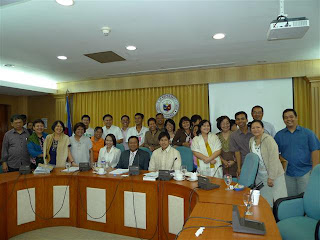The GREAT Women Project implemented by the Philippine Commission of Women, added to its list of activities in celebrating International Women's Month (March), the conduct of Talakayan: Kababaihan Iahon sa Kahirapan on March 29, 2011 at the BSWM Convention Hall of the Bureau of Soils, Visayas Road, Quezon City. The Gender Responsive Economic Actions for the Transformation (GREAT) of Women is supported by the Canadian International Development Agency (CIDA) in provinces such as : Quezon, Ifugao, Metro Naga Development Council, Bohol, Iloilo, Leyte, Davao del Sur, PPALMA Alliance and 36 municipalities.
The project's expected result is major changes in mindsets of Phil Commission of Women, National Government Agencies and Local Government Units to : 1) help women scale up businesses through value- chain development, 2) for NGA's and LGU's to recognize the need to harmonize plans, and 3) for LGU's to increase appreciation of gender-responsiveness in all plans and programs.
The Talakayan featured wealth of information from presentation of various agencies such as DTI-BMSMED, DOLE, DWSD, DOST, DAR, PhilHealth, SSS, OPAPP, PCFC on projects and programs that would help entrepreneurship for women and NEDA on the Millenium Development Goals.
The Talakayan featured wealth of information from presentation of various agencies such as DTI-BMSMED, DOLE, DWSD, DOST, DAR, PhilHealth, SSS, OPAPP, PCFC on projects and programs that would help entrepreneurship for women and NEDA on the Millenium Development Goals.
Susanita Tesiorna, President of ALLWIES and Josephine Parilla of PATAMABA and Treasurer of ALLWIES were reactors on social protection, livelihood and enterprise development presentations. The reactions including that of an LGU representative is hoped to improve the implementation of various programs and projects of the government for socio-economic to help achieve the goal of socio-economic empowerment of women.
To mention some of Susanita Tesiorna's reaction, she spoke on the call to have transparent selection criteria for the P500M funds to finance health insurance for the informal sector under PhilHealth Board Resoultion Nos. 1478 and 1479 passed in the last PPhil Health Board Meeting and recommended that it should be in according to the poorest provinces identified by the National Statistics Coordination Board launched earlier of this year. She also spoke that the problem of lack information, just like other services of the government, is perennial and PHIC should implement one of the provisions in RA 7875 to tap community based organizations like BHW to help disseminate information. Further, she said that information is not enough but educating the communites about the importance of social security until the culture of social security in cultivated in every Filipno home. SSS and OSH related agencie should do likewise. She also mentioned that in the RA 7857, indigents should graduate into an independent paying member, that the question of when to stop subsidizing was put forward.
She also mentioned that it is worth noting that 15 years ago, the advocacy of her organization and partners spoke of lack of social protection, lack of access to productive resources, and at least on these two major sectoral issues, she can say that since 2005, the cry is towards improved access. There is great hope for Filipinos if all systems work in an integrated approach as the government also went out of their "boxes" to meet the challenge of reality economy..
 |
| Susanita Tesiorna |
 |
| DSWD Chorale |
 |
| Dir. Rhodora Leano, Bureau of MSME Development |
 |
| For the Agrarian Reform Communities |










